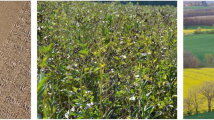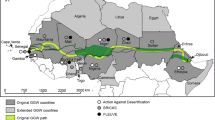Abstract
To explain how agricultural landscapes become social constructions of the natural environment, this essay utilizes Jurgen Habermas's concept of rationality and Pierre Bourdieu's constructs of field and habitus to examine how social relationships shape the way three farmers perceive, alter, and evaluate their land. Intensive interviewing and aerial photographs are used to document the processes through which farmers internalize the primary rationalities of social relationships as a foundation of decision-making regarding water impoundments on their land. One farmer internalizes an instrumental rationality while interacting within relationships with the economic and political system; his landscape changes are meant to improve his ability to extract profit from the land. A second case focuses on a farmer who draws upon familial relationships to provide a substantive counter to the instrumental rationalities of economic relationships; he built a pond to conserve soil. The final case is of a farmer who resists social relationships governed by an instrumental rationality; he built a pond to improve and preserve the beauty of his farm.
Similar content being viewed by others
References
Bourdieu, Pierre and Loic J. D. Wacquant. 1992.An Invitation to Reflexive Sociology. Chicago: University of Chicago Press.
Bourdieu, Pierre. 1984.Homo Academicus. Trans. by Peter Collier. Stanford: Stanford University Press.
——. 1977.Outline of a Theory of Practice. Trans. by Richard Nice. Cambridge: Cambridge University Press.
Carlson, John E., Barbara Schnable, Curtis E. Beus, and Don A. Dillman. “Changes in the soil conservation attitudes and behaviors of farmers in the Palouse and Camas prairies: 1976 1990.”Journal of Soil and Water Conservation 49 (Sept.–Oct., 1994): 493–500.
Cosgrove, Denis. 1984.Social Formation and Symbolic Landscape. London: Croom Helm.
Ervin, C. A. and D. Ervin. “Factors Affecting the Use of Soil Conservation Practices: Hypotheses, Evidence, and Policy Implications.”Land Economics 58 (Aug., 1982): 278–292.
Forman, Richard T. T. and Michel Godron. 1986.Landscape Ecology. New York: John Wiley & Sons.
Geertz, Clifford. 1973.The Interpretation of Cultures. New York: Basic Books, Inc.
Giddens, Anthony. 1984.The Constitution of Society. Berkeley: University of California Press.
Gilbert, Jess and Thomas M. Beckley. “Ownership and Control of Farmland: Landlord-Tenant Relations in Wisconsin.”Rural Sociology 58 (Winter, 1993): 569–579.
Gould, B. W., W. Saupe, and R. Klemme. “Conservation Tillage: The Role of Farm and Operator Characteristics and the Perception of Soil Erosion.”Land Economics 65 (May, 1989): 167–182.
Greider, Thomas and Lorraine Garkovich. “Landscape: The Social Construction of Nature and the Environment.”Rural Sociology 59 (Spring, 1994): 1–24.
Habermas, Jurgen. 1987.The Theory of Communicative Action: Lifeworld and System: A Critique of Functionalist Reason. Vol. II. Trans. by Thomas McCarthy. Boston: Beacon Press.
——. 1984.The Theory of Communicative Action: Reason and the Rationalization of Society. Vol. I. Trans. by Thomas McCarthy. Boston: Beacon Press.
Horn, Frederick E. 1992.Soil Survey of Callaway County, Missouri. Washington, DC: United States Department of Agriculture.
Korsching, P. F., C. Stofferahn, P. Nowack, and D. Wagner. “Adopter Characteristics and Adoption Patters of Minimum Tillage: Implications for Soil Conservation Programs.”Journal of Soil and Water Conservation 38 (Sept.–Oct., 1983): 428–31.
Krebs, A. V. 1991.The Corporate Reapers: The Book of Agribusiness. Washington, DC: Essential Books.
Mooney, Patrick H. 1988.My Own Boss? Class, Rationality, and the Family Farm. Boulder, CO: Westview Press.
Munch, Richard. 1994.Social Theory. Chicago: Nelson-Hall.
Penning-Rowsell, Edmund C. and David Lowenthal, Editors. 1986.Landscape Meanings and Values. London: Unwin Hyman Ltd.
Rikoon, J. Sanford. 1995. “Towards a Performance-Based Study of Conservation.” Unpublished. Columbia: University of Missouri.
Salamon, Sonya. “Culture and Agricultural Land Tenure.”Rural Sociology 58 (Winter, 1993): 580–598.
Schnaiberg, Allan. 1980.The Environment: From Surplus to Scarcity. New York: Oxford University Press.
Sewell, William H., Jr. “A Theory of Structure: Duality, Agency, and Transformation.”American Journal of Sociology 98 (July, 1992): 1–29.
Steiner, Frederick R. 1990.Soil Conservation in the United States: Policy and Planning. Baltimore: Johns Hopkins University Press.
Urry, John. 1990.The Tourist Gaze. London: Sage Publications Ltd.
Ward, Neil and Richard Munton. 1992. “Conceptualizing Agriculture-Environment Relations.”Sociologia Ruralis 22(1): 127–145.
Weber, Max. 1947.The Theory of Social and Economic Organization. Trans. and ed. by Talcot Parsons and A. M. Henderson. New York: The Free Press.
Additional information
Leland L. Glenna is a graduate student in the department of rural sociology at the University of Missouri-Columbia. His research interests include ethics, the sociology of agriculture, and environmental sociology. He is currently working on his dissertation in which he is using discourse ethics to critique the environmental and social consequences of the way standards for small grain commodity production are introduced to farmers.
Rights and permissions
About this article
Cite this article
Glenna, L.L. Rationality, habitus, and agricultural landscapes: Ethnographic case studies in landscape sociology. Agric Hum Values 13, 21–38 (1996). https://doi.org/10.1007/BF01530521
Issue Date:
DOI: https://doi.org/10.1007/BF01530521




